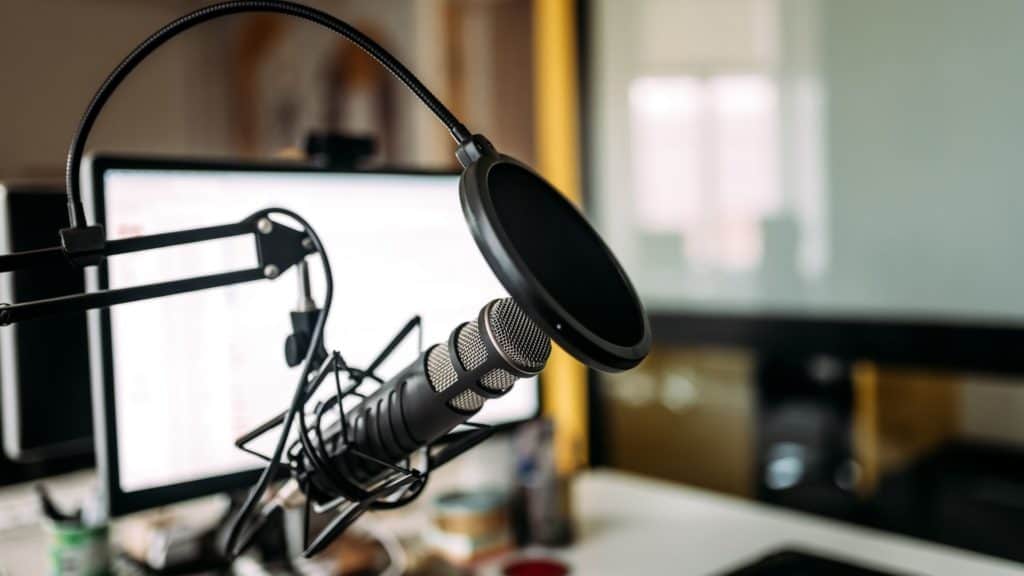The podcast industry around the world is exploding. More and more South Africans are getting in on the action too. You too might be wondering how to start a podcast in South Africa.
The good news is, it’s never been easier to start a podcast in South Africa.
In order to start a podcast in South Africa, these are the steps you need to take:
- Decide on your podcast topic and name
- Select the frequency and format of your podcast
- Purchase the podcast recording and editing equipment you need
- Decide on a podcast host in South Africa
- Choose the best channels to promote your podcast
I’ll be digging into each of these topics in more depth in this article. (You can click on any of the links above to go directly to that section)
The growth of podcasts as a medium over the last few years has been incredible.
Much of that growth is thanks to smash hits like the true-crime drama Serial. More people are listening to podcasts than ever before.
All the major radio stations in South Africa are turning to podcasts. And independent podcast producers are popping up all the time.
The time has never been better to start your own podcast in South Africa.
I created my first podcast in South Africa over 10 years ago.
Things have changed a lot and I’ve learnt a lot of the things that work and those that don’t.
I’m going to try and share a few of those so that you don’t make the same mistakes I did when starting out. The first thing you need to do before you do anything else is…

Choosing a topic for your podcast in South Africa
When the light bulb goes on for most people that they want to start a podcast, they have an idea about the topic they want their show to be about.
It’s that initial excitement that gets them going down the podcasting rabbit hole.
That is probably the reason you’re here…
Very often a brand new podcaster thinks they should combine all their interests into one podcast. Their interest may lie in restoring vintage cars, share trading and gardening.
I don’t know about you, but I don’t want to listen to a podcast about all three of those topics in one show.
When you try and combine all your interests into one podcast, you alienate your audience.
Let’s say I love vintage cars. I stumble across your podcast and talking about restoring a 67 Ford Mustang.
If next week you’re talking about trimming back your azaleas, you’ve lost me as a listener. Select one topic or niche and become the go-to podcast for that subject.
How often should you publish and what is the ideal length of a podcast
These are two of the most difficult questions to answer when starting the podcast.
There is no hard-and-fast rule that you should publish a certain number of episodes a week or month.
There is no rule that states it should be of a certain duration. I know of very successful podcasts that publish short 2 to 3 minute snippets daily.
I also know of podcasts that are a few hours long that get published once every 2 to 4 weeks. The two things I do know for sure about podcasts is the following:
- Be consistent
Decide on a publishing schedule and stick to it. Listeners of your podcast will soon get into the rhythm of your publishing schedule. They’ll come to expect a new episode when you say you’re going to publish one. The quickest way to lose listeners is to stop being consistent.
- Respect your listeners time
That’s a roundabout way of saying get to the point. Listeners will listen to your podcast for as long as you keep their attention. If you could take 10 minutes to make the point you’re trying to make, don’t turn it into an hour-long podcast.
Choosing a format for your podcast
When I talk about the format of your podcast I am referring to the style all the structure of your show. There are numerous formats to describe a podcast and some of them may include:
- One-on-One Interview shows
- Solo Commentary shows
- Panel or Group discussions or interviews
- Non-Fictional Story Telling
- Fictional Story Telling
- Repurposed Audio Content
The format or style of your podcast will often dictate the frequency as well as the length of each show.
The format will also dictate the gear or equipment that you need to podcast.

The equipment needed to start a podcast in South Africa
As mentioned above, the audio equipment or gear you need to record, edit and publish your podcast will depend on the style or format of your show. As a really basic set-up, this is the equipment you will need to start a podcast in South Africa:
- A good microphone
- Headphones
- A pop filter
- Recording and editing software. …
- A podcast hosting account.
There are so many different options when it comes to podcast equipment, that it is easy to get overwhelmed and not even start.
The equipment you buy will be dependent on the amount of money you are willing to invest.
If you are looking for the basic entry-level podcast starter kit, this one is perfect.
I also use this USB microphone that plugs directly into my Mac to record podcasts on.
I’ve also found this double lapel microphone works quite well.
When it comes to recording and editing software, I use something called Audacity.
Once you recorded and edited your podcast the next thing you need to do is find a podcast in host in South Africa…
Podcast hosting in South Africa
When I first started podcasting in 2010, there were no South African podcast hosting companies.
That has thankfully changed…
When starting a podcast in South Africa, you can host with one of the large podcast hosting companies in the world like Podbean or Libsyn
I currently host all my podcast audio files with iono.fm
iono.fm is a South African based startup, who specialise in podcast hosting and live streaming.
I love the fact that they’re in Cape Town and I can pick up the phone, or if I’m in the area, I can swing by for a chat about podcasting.
How to promote your podcast in South Africa
Once you’ve recorded edited and published your podcast your next job is to grow your audience.
The promotion of your podcast is just as important as the steps we’ve just run through for creating it.
Failing to work hard at this stage will almost guarantee that your podcast fails. There are various ways that you can grow your podcast download numbers in South Africa.
Below are some of the ways I promote my podcasts:
- Social media
- My email database
- Paid advertising on platforms like Facebook
- Getting interviewed on other podcasts
- Getting featured in mainstream publications
- and partnering with other podcast is and content creators
Another way to grow your podcast audience is to make sure that your podcast feed is syndicated.
Syndicating allows platforms like Apple Podcasts, Spotify, Overcast, and Stitcher to distribute your podcast on their platforms.
How to get your podcast Apple Podcasts and Spotify in South Africa
Once you have your podcast hosting setup you will receive an RSS feed from your host.
It’s that RSS feed that enables a subscriber to have the latest episode of the podcast sent to the device, automatically.
Once your RSS feed is up and running you can submit it to the various platforms like Apple Podcasts and Spotify.
The good news is you only need to do this once. Every time you publish your new episode after you’ve submitted your feed, it will update across all the different platforms.
If you would like to find out more about starting your own podcast in South Africa be sure to check out The Podcasting Academy.
The Podcasting Academy is a step-by-step online course that will walk you through the entire process of choosing a topic, researching, recording and editing your podcast episodes and publishing them.
Also included in The Podcasting Academy is a bonus module on how to make money off your podcast in South Africa. You can click here to learn more.
This is just a general overview of how to start a podcast in South Africa.
In future posts, I will be digging into each of these topics in more detail in the coming weeks and moths. I’ll also be showing you exactly how to build these platforms in various video tutorials that I’ll be uploading to my YouTube channel.
If you have any questions about generating an income online in South Africa today feel free to be in touch via Facebook or Twitter.
